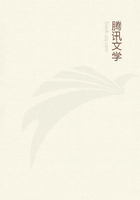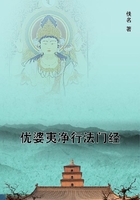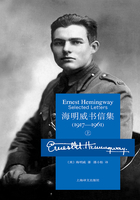Proof--Whatsoever takes place in the object of any idea, its idea is in God (by Prop. iii. of this part), not in so far as he is infinite, but in so far as he is considered as affected by another idea of an individual thing (by the last Prop.); but (by Prop. vii. of this part) the order and connection of ideas is the same as the order and connection of things. The knowledge, therefore, of that which takes place in any individual object will be in God, in so far only as he has the idea of that object. Q.E.D.
X. The being of substance does not appertain to the essence of man--in other words, substance does not constitute the actual being (forma) of man.
Proof--The being of substance involves necessary existence (Part i., Prop. vii.). If, therefore, the being of substance appertains to the essence of man, substance being granted, man would necessarily be granted also (II. Def. ii.), and, consequently, man would necessarily exist, which is absurd (II. Ax. i.). Therefore &c. Q.E.D.
*****Note--This proposition may also be proved from I.v., in which it is shown that there cannot be two substances of the same nature; for as there may be many men, the being of substance is not that which constitutes the actual being of man.
Again, the proposition is evident from the other properties of substance--namely, that substance is in its nature infinite, immutable, indivisible, &c., as anyone may see for himself.
Corollary--Hence it follows, that the essence of man is constituted by certain modifications of the attributes of God.
For (by the last Prop.) the being of substance does not belong to the essence of man. That essence therefore (by I. xv.) is something which is in God, and which without God can neither be nor be conceived, whether it be a modification (I. xxv. Cor.), or a mode which expresses God's nature in a certain conditioned manner.
*****Note--Everyone must surely admit, that nothing can be or be conceived without God. All men agree that God is the one and only cause of all things, both of their essence and of their existence; that is, God is not only the cause of things in respect to their being made (secundum fieri), but also in respect to their being (secundum esse).
At the same time many assert, that that, without which a thing cannot be nor be conceived, belongs to the essence of that thing; wherefore they believe that either the nature of God appertains to the essence of created things, or else that created things can be or be conceived without God; or else, as is more probably the case, they hold inconsistent doctrines. I think the cause for such confusion is mainly, that they do not keep to the proper order of philosophic thinking. The nature of God, which should be reflected on first, inasmuch as it is prior both in the order of knowledge and the order of nature, they have taken to be last in the order of knowledge, and have put into the first place what they call the objects of sensation; hence, while they are considering natural phenomena, they give no attention at all to the divine nature, and, when afterwards they apply their mind to the study of the divine nature, they are quite unable to bear in mind the first hypotheses, with which they have overlaid the knowledge of natural phenomena, inasmuch as such hypotheses are no help towards understanding the divine nature. So that it is hardly to be wondered at, that these persons contradict themselves freely.
However, I pass over this point. My intention her was only to give a reason for not saying, that that, without which a thing cannot be or be conceived, belongs to the essence of that thing: individual things cannot be or be conceived without God, yet God does not appertain to their essence. I said that "I considered as belonging to the essence of a thing that, which being given, the thing is necessarily given also, and which being removed, the thing is necessarily removed also; or that without which the thing, and which itself without the thing can neither be nor be conceived." (II. Def. ii.)
XI. The first element, which constitutes the actual being of the human mind, is the idea of some particular thing actually existing.
Proof--The essence of man (by the Cor. of the last Prop.) is constituted by certain modes of the attributes of God, namely (by II. Ax. ii.), by the modes of thinking, of all which (by II.
Ax. iii.) the idea is prior in nature, and, when the idea is given, the other modes (namely, those of which the idea is prior in nature) must be in the same individual (by the same Axiom).
Therefore an idea is the first element constituting the human mind. But not the idea of a non-existent thing, for then (II. viii. Cor.) the idea itself cannot be said to exist; it must therefore be the idea of something actually existing. But not of an infinite thing. For an infinite thing (I. xxi., xxii.), must always necessarily exist; this would (by II. Ax. i.) involve an absurdity. Therefore the first element, which constitutes the actual being of the human mind, is the idea of something actually existing. Q.E.D.
Corollary--Hence it follows, that the human mind is part of the infinite intellect of God; thus when we say, that the human mind perceives this or that, we make the assertion, that God has this or that idea, not in so far as he is infinite, but in so far as he is displayed through the nature of the human mind, or in so far as he constitutes the essence of the human mind; and when we say that God has this or that idea, not only in so far as he constitutes the essence of the human mind, but also in so far as he, simultaneously with the human mind, has the further idea of another thing, we assert that the human mind perceives a thing in part or inadequately.
*****Note--Here, I doubt not, readers will come to a stand, and will call to mind many things which will cause them to hesitate; I therefore beg them to accompany me slowly, step by step, and not to pronounce on my statements, till they have read to the end.

